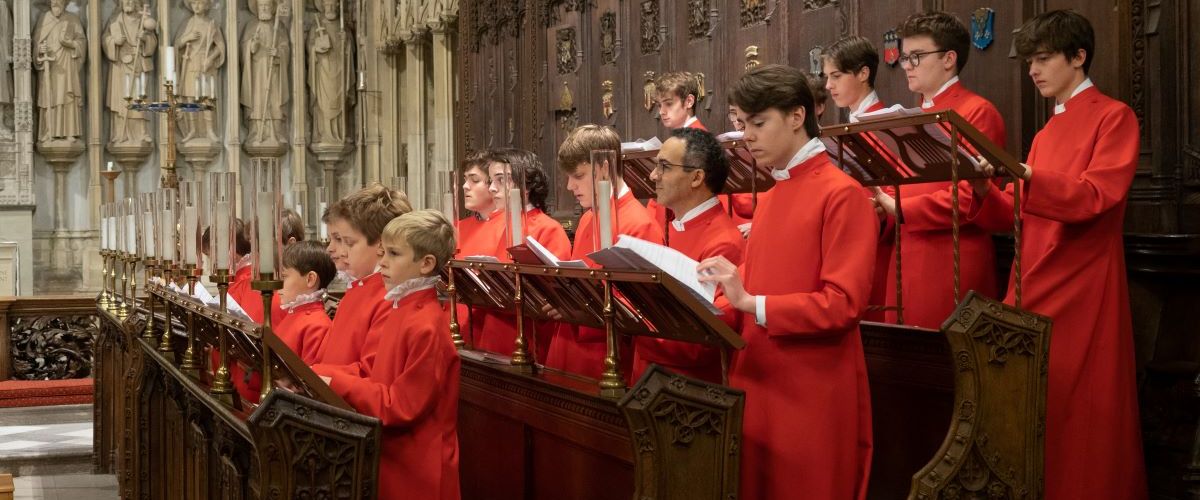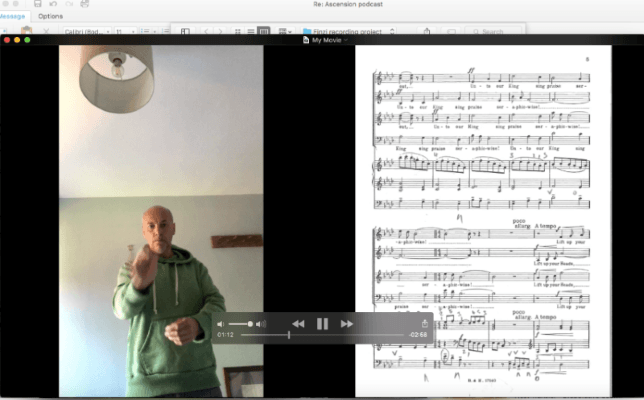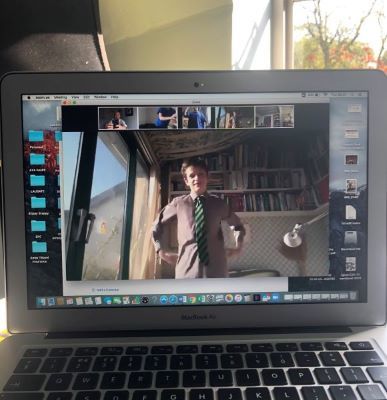

Quiristers Sing On Through Lockdown
Adjusting to remote singing
The days running up to the March ‘lockdown’ were busy ones for the Chapel Choir. The Quiristers sang in Carmina Burana at Birmingham Symphony Hall with the London Concert Orchestra and Birmingham Bach Choir on the Saturday. Sunday morning Chapel included a very beautiful Byrd Mass for Three Voices, sung by the older boys (Altos, Tenors and Basses, known as ATBs), before the working week started as normal: Quirister rehearsal at lunchtime; ATBs with Mr Cunningham in the evening.
However, that combination of busyness and routine, which the boys thrive on, changed overnight. Like other Collegiate and Cathedral choirs up and down the country, we were suddenly faced with big questions and challenges about how to carry on singing remotely, and in a meaningful way.
Quiristers have been singing at Winchester almost entirely uninterrupted since 1394. Neither of the world wars seem to have had an effect on sung services in Chapel.
The present cohort of Quiristers and ATBs are hard working, talented and dedicated choristers, and we knew that we had to carry on this long tradition of singing, vocal training and performing. Zoom and mobile phones to the rescue.
Since the start of term, I have had daily Zoom sessions with groups of Quiristers, involving warm-ups, note-learning, aural work, discussion and sight singing. In effect, mirroring our ‘normal’ work in Chapel. The challenges are considerable and no one can deny that musically, we are severely compromised under the current regime. Perhaps the main drawback is that for most of the session, the Quiristers are on mute and singing in isolation. Singing together, listening, and learning from others is a vital ingredient of any successful choir. In their usual Chapel rehearsals, the relatively inexperienced Year 6 probationers are strategically placed alongside the oldest boys who have extensive singing experience, ranging from high-profile services and concerts, to recordings and tours.
Preparing for Ascension Day
As we settled into our new way of working, we began to involve the ATBs in a piece for Ascension Day to be recorded remotely. A rich selection of choral music was at our disposal, including CV Stanford’s Coelos Ascendit Hodie and Peter Phillips’ polyphonic masterpiece, Ascendit Deus. Yet it was to English composer Gerald Finzi that we turned our attentions. The Chapel Choir gave a moving account of his extended anthem Lo, the Full, Final Sacrifice in the Glee Club concert last November in the Cathedral, so I felt confident it was a style they would enjoy singing.
Finzi wrote God is Gone Up in 1951 for a St Cecilia’s Day Service at St. Sepulchre’s Church, Holborn. It now most commonly associated with Ascensiontide, with its strident rising fifth melodic statement to the opening line of Edward Taylor’s text as its signature.
Having consulted colleagues who had already embarked on ambitious remote recording projects, it became clear that we would need to follow a very precise order and sequence of events for it to work.
Putting the Plan in Action
- Mr. Cunningham recorded the organ accompaniment;
- I videoed myself at home conducting an imaginary choir with the organ music in the background;
- A professional quintet, including three of our own dons, recorded the vocal lines individually;
- The Chapel Choir used the video of me, the organ music and professional singers to record their individual parts at home onto their mobile phones; and finally,
- Mr. Cunningham undertook the mammoth job of mixing and syncing all the voices together.
After three weeks of hard work from all involved, we have a finished product that we very much hope you’ll enjoy. Most importantly, I hope listening to it will give you a strong sense of all the sounds that we are so familiar with in Chapel.



 Head back to stories
Head back to stories